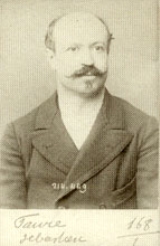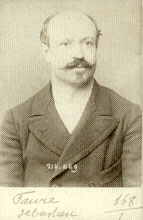
Sébastien Faure
Encyclopedia

Anarchism in France
Thinker Pierre-Joseph Proudhon, who grew up during the Restoration was the first self-described anarchist. French anarchists fought in the Spanish Civil War as volunteers in the International Brigades. French anarchism reached its height in the late 19th century...
(January 6, 1858, Saint-Étienne
Saint-Étienne
Saint-Étienne is a city in eastern central France. It is located in the Massif Central, southwest of Lyon in the Rhône-Alpes region, along the trunk road that connects Toulouse with Lyon...
, Loire
Loire
Loire is an administrative department in the east-central part of France occupying the River Loire's upper reaches.-History:Loire was created in 1793 when after just 3½ years the young Rhône-et-Loire department was split into two. This was a response to counter-Revolutionary activities in Lyon...
- July 14, 1942 Royan
Royan
Royan is a commune in the Charente-Maritime department, along the Atlantic Ocean, in southwestern France.A seaside resort, Royan is in the heart of an urban area estimated at 38,638 inhabitants, which makes it the fourth-largest conurbation in the department, after La Rochelle, Rochefort and Saintes...
). He was a main proponent of the anarchist organizational form known as synthesis anarchism
Synthesis anarchism
Synthesis anarchism, synthesist anarchism, synthesism or synthesis federations is a form of anarchist organization which tries to join anarchists of different tendencies under the principles of anarchism without adjectives. In the 1920s this form found as its main proponents the anarcho-communists...
.
Biography
Before becoming a free-thinker, he was a seminarist. He engaged in politics and became a member of the socialist working party, but eventually turned to anarchismAnarchism
Anarchism is generally defined as the political philosophy which holds the state to be undesirable, unnecessary, and harmful, or alternatively as opposing authority in the conduct of human relations...
in 1888.
In 1894, he was prosecuted in "The Trial of the thirty
Trial of the thirty
The Trial of the Thirty was a trial in 1894 in Paris, France, aimed at legitimizing the lois scélérates passed in 1893-1894 against the anarchist movement and restricting press freedom by proving the existence of an effective association between anarchists.Lasting from 6 August-31 October in 1894,...
" ("Procès des trente"), but was acquitted. In 1895, he cofounded "Le Libertaire" with Louise Michel
Louise Michel
Louise Michel was a French anarchist, school teacher and medical worker. She often used the pseudonym Clémence and was also known as the red virgin of Montmartre...
, taking the name of the earlier journal by Joseph Déjacque
Joseph Déjacque
Joseph Déjacque was a French anarcho-communist poet and writer. He sought to abolish "personal property, property in land, buildings, workshops, shops, property in anything that is an instrument of work, production or consumption."Déjacque was the first to employ the term libertarian in a...
. At the time of the Dreyfus affair
Dreyfus Affair
The Dreyfus affair was a political scandal that divided France in the 1890s and the early 1900s. It involved the conviction for treason in November 1894 of Captain Alfred Dreyfus, a young French artillery officer of Alsatian Jewish descent...
, he was one of the leading supporters of Alfred Dreyfus
Alfred Dreyfus
Alfred Dreyfus was a French artillery officer of Jewish background whose trial and conviction in 1894 on charges of treason became one of the most tense political dramas in modern French and European history...
. In 1904, he created a libertarian school called "La Ruche" (The Hive
The Hive
The Hive has multiple meanings:* The Hive , a once-popular web site for the discussion of the chemistry of mind-altering drugs* Hive , a group of characters in The Transformers TV cartoon...
) close to Rambouillet
Rambouillet
Rambouillet is a commune in the Yvelines department in the Île-de-France in north-central France.It is located in the suburbs of Paris southwest from the center...
. In 1916, he launched the periodical "Ce qu'il faut dire". Faure also co-founded (with Voline) the Synthesis
Synthesis anarchism
Synthesis anarchism, synthesist anarchism, synthesism or synthesis federations is a form of anarchist organization which tries to join anarchists of different tendencies under the principles of anarchism without adjectives. In the 1920s this form found as its main proponents the anarcho-communists...
, or also known as synthesis anarchism
Synthesis anarchism
Synthesis anarchism, synthesist anarchism, synthesism or synthesis federations is a form of anarchist organization which tries to join anarchists of different tendencies under the principles of anarchism without adjectives. In the 1920s this form found as its main proponents the anarcho-communists...
which was an influential form of conveiving anarchist federations.
In 1918, he was imprisoned for organizing an illegal meeting. He is recognized for his pedagogy
Pedagogy
Pedagogy is the study of being a teacher or the process of teaching. The term generally refers to strategies of instruction, or a style of instruction....
and his qualities as a speaker, and is the author of several books:
- The universal pain (1895)
- My Communism (1921)
- The Forces Of The Revolution (1921)
- Religious imposture (1923)
- Subversive remarks
- Twelve Proofs of God's Inexistence (PDF) (1908)
He was also the founder of the Anarchist encyclopedia
Anarchist encyclopedia
The Anarchist Encyclopedia is an encyclopedia initiated by Sebastien Faure, between 1925 and 1934, published in 4 volumes.The original project was to be in five parts:#an anarchist dictionary#the history of the thought and the anarchist action...
, as well as the namesake of the Sébastien Faure Century
Sébastien Faure Century
The Sébastien Faure Century was the French/Italian contingent of the Durruti Column during the Spanish Civil War, named for the anarchist of the same name. It formed the First Century of the International Group, and consisted of about fifty members from France, Italy, and other countries...
, the French-speaking contingent of the Durruti Column
Durruti Column
The Durruti Column was the largest anarchist column formed during the Spanish Civil War . During the first months of the war it has come to be the most recognized and popular military organisations fighting at the republican side...
.
Synthesis anarchism
The discussion about the Anarchist Synthesis arises in the context of the discussion on the Organisational Platform of the Libertarian CommunistsPlatformism
Platformism is a tendency within the wider anarchist movement originally theorised by Nestor Makhno and is mainly based on his concept of anarchism and the organisational theories in the tradition of Dielo Truda's Organizational Platform of the General Union of Anarchists ...
, written by the Dielo Truda group of Russian exiles in 1926.
Two texts made as responses to the Platform, each proposing a different organizational model, became the basis for what is known as the organisation of synthesis, or simply "synthesism".
Voline published in 1924 a paper calling for "the anarchist synthesis" and was also the author of the article in Sebastian Faure's Encyclopedie Anarchiste on the same topic. The main purpose behind the synthesis was that the anarchist movement in most countries was divided into three main tendencies: communist anarchism, anarcho-syndicalism
Anarcho-syndicalism
Anarcho-syndicalism is a branch of anarchism which focuses on the labour movement. The word syndicalism comes from the French word syndicat which means trade union , from the Latin word syndicus which in turn comes from the Greek word σύνδικος which means caretaker of an issue...
, and individualist anarchism
Individualist anarchism
Individualist anarchism refers to several traditions of thought within the anarchist movement that emphasize the individual and his or her will over external determinants such as groups, society, traditions, and ideological systems. Individualist anarchism is not a single philosophy but refers to a...
and so such an organization could contain anarchists of these 3 tendencies very well.
The platformists wanted to push their ideas forward through organizing an international anarchist congress on February 12, 1927. Shortly later in the National Congress of the French Anarchist Union (UAF), the Dielo Truda Group achieved making their platform more popular and so they made the UAF change its name into Revolutionary Anarcho-Communist Union (UACR). Sebastian Faure led a faction within the UACR that decided to separate themselves from this organization and form outside it the Association of Federalist Anarchists (AFA), thinking that traditional anarchist ideas were being threatened by the Dielo Truda platform. Shortly later in his text "Anarchist synthesis" he exposes the view that "these currents were not contradictory but complementary, each having a role within anarchism: anarcho-syndicalism
Anarcho-syndicalism
Anarcho-syndicalism is a branch of anarchism which focuses on the labour movement. The word syndicalism comes from the French word syndicat which means trade union , from the Latin word syndicus which in turn comes from the Greek word σύνδικος which means caretaker of an issue...
as the strength of the mass organisations and the best way for the practice of anarchism; libertarian communism
Libertarian communism
Libertarian communism is a theory of libertarianism which advocates the abolition of the state and private property, and capitalism in favor of common ownership of the means of production, a direct democracy and self-governance....
as a proposed future society based on the distribution of the fruits of labour according to the needs of each one; anarcho-individualism as a negation of oppression and affirming the individual right to development of the individual, seeking to please them in every way. Sebastian Faure had strong contacts in Spain and so his proposal had more impact in spanish anarchists than the Dielo Truda platform even though individualist anarchist influence in Spain was less strong than it was in France. The main goal there was conciling anarcho-communism with anarcho-syndicalism.
Views
Faure's view of pedadogy was that every single aspect of a human being had to be developed. Faure identified three aspects: physical, mental and moral. He thought that a man or a woman needed to be able to accomplish physical, manual tasks as well as to have a minimum of culture and think and be able to develop ideas. All this in a respectful, mutual, equal and free environnment.La Ruche
Created in 1904, the source of capital for La Ruche (The Hive) at the beginning was the product of Faure's seminars. It became self-sufficient in three years' time. Its founding principles were similar to Proudhon's Permanent Education and Paul Robin's "good birth, good education and good social organisation."The three main spheres of pedagogy were fulfilled through classes, work in the field and all the different activities necessary to ensure the self-sufficiency of the Hive. The moral values were implemented through respect of the child's autonomy, positive method, absence of ranking or any form of categorization (except some activities were reserved to particular groups of age), coeducation, and sexual education (all activities being mixed.)
External links and references
- Sébastien Faure page at the Daily Bleed's Anarchist Encyclopedia
- The anarchist encyclopedia Volume 1 Volume 2 Volume 3 Volume 4
- Faure Archive in Anarchy Archives
- The Revolutionary Forces by Sebastien Faure
- Works by Sébastien Faure (public domain in Canada)

